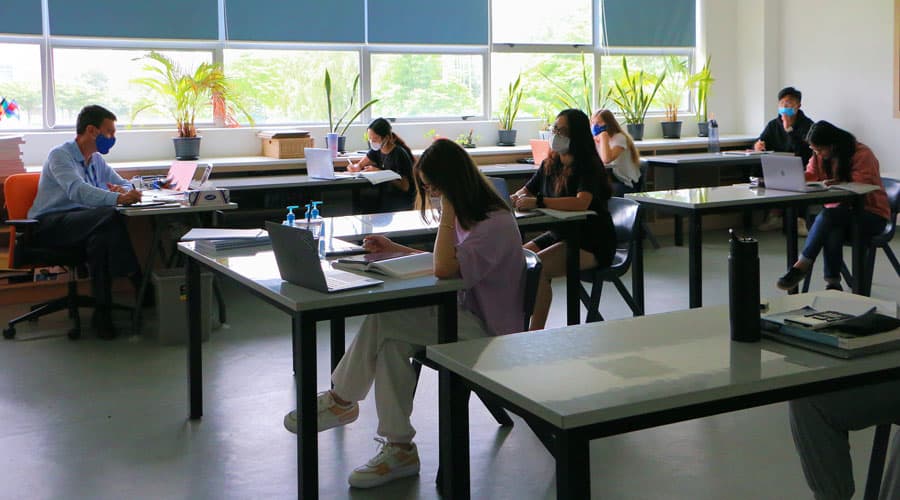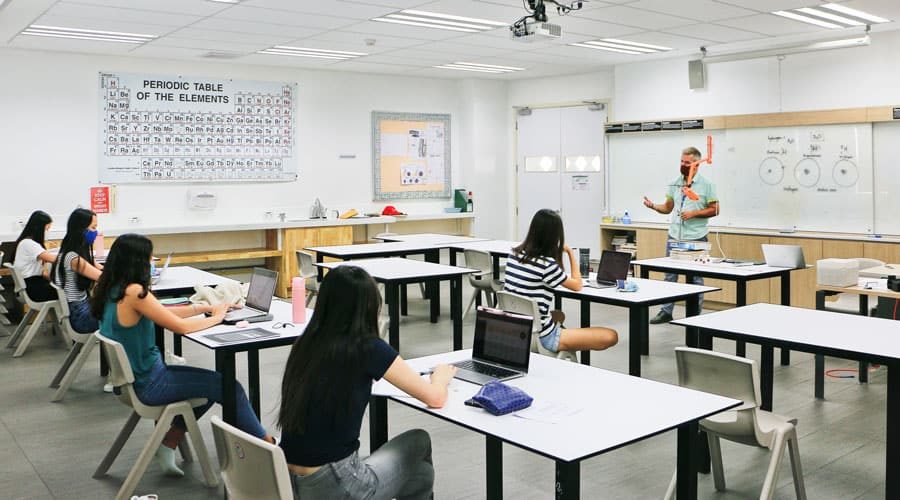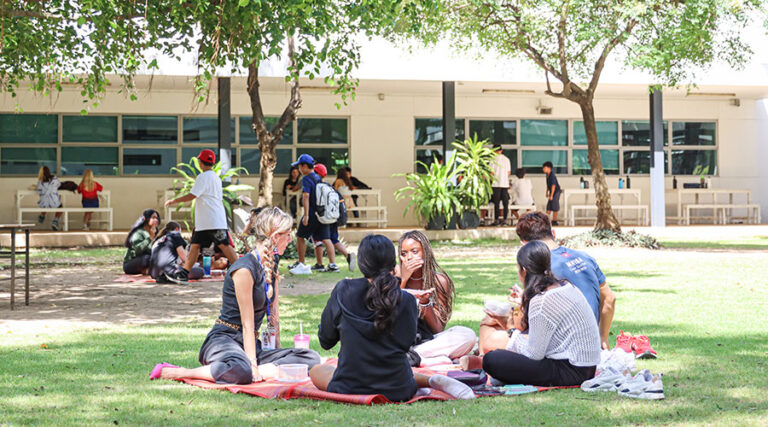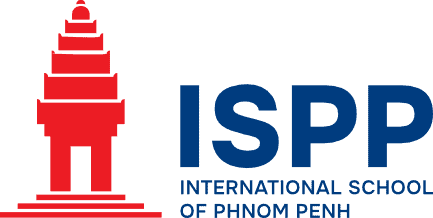How learning is shaped at ISPP and how we can use learning data to further adapt practices that can have a greater impact on learning.
At ISPP, our Guiding Statements and core values of Learning, Community, Environment and Wellbeing provide a framework for all stakeholders to focus our attention on our collective vision and purpose. This article will outline key components of how learning is viewed at ISPP and present key learning data to our community.
An IB Education
The International Baccalaureate (IB) Programmes provide a framework for how learning is shaped at ISPP and the school has had a long affiliation with the IB Organization. In 1999-2000, the Board made a decision to become an IB World School and ISPP was authorised as an IB Diploma school (DP) in 2000. In 2001, the school was also authorised to offer the IB Middle Years Programme (MYP) and the IB Primary Years Programme (PYP) authorisation was granted in September 2004. This makes ISPP one of the oldest IB World Schools in the region.
As was the case 20 years ago, the school continues to believe that the IB programmes provide an appropriate, holistic approach to education that best suits the needs of the diverse range of students that come through our doors. An IB education is centred on the notion of building characteristics that are not only vital for learning but also help make us good people who can help make a better world. The IB Learner Profile is a part of ISPP’s guiding statements and even though they are communicated to our community frequently, it is worth highlighting them when discussing what is at the core of learning at ISPP. The ten attributes reflect the holistic nature of an IB education. They highlight the importance of nurturing dispositions such as curiosity and compassion as well as developing knowledge and skills. They also highlight that, along with cognitive development, IB programmes are concerned with students’ social, emotional and physical well-being, and with ensuring that students learn to respect themselves, others, and the world around them.
ISPP Learning Principles
Learning, as a core value of the school, is captured best in the ISPP Learning Principles, which defines effective learning around six broad themes. These principles were developed in 2017 to provide alignment for all stakeholders regarding ISPP’s approach to high-quality learning and teaching. They have been key in refining hiring practices to ensure that high-quality teachers with appropriate training, and also our community, have a shared belief in ISPP’s approach to learning and teaching.
Accreditation Update
Since January 2020, the administration has been preparing for our next round of re-accreditation with our accrediting agencies, the Council of International Schools (CIS), Western Association of Schools and Colleges (WASC) and the International Baccalaureate (IB). In early September, the school submitted a preparatory report and participated in a preparatory evaluation visit at the end of September. This visit was conducted virtually, which provided new challenges to the ever-changing landscape of teaching, learning and school compliance in the world of COVID-19. The school feels it is well prepared to meet these challenges and is looking forward to receiving feedback from this visit in order to inform future action planning.
After the feedback from the virtual preparatory visit, the school will embark on the full self-study process, where teachers and key stakeholders will participate in groups focusing on specific elements of school operations. These domains are set-out by CIS/WASC and in conjunction with the IB, the accrediting agencies will work together in synchronised processes, culminating in a full evaluation visit which is scheduled for October 2021.

International School Assessments (ISA)
At ISPP, we use externally benchmarked information such as the International School Assessments (ISAs). The ISA assessment program is designed specifically for students in international schools in Grades 3–10. It is based on the internationally endorsed reading, mathematical literacy and scientific literacy frameworks of the OECD’s Programme for International Student Assessment (PISA). In 2018, over 90,000 students from 400 schools across nearly 80 countries participated in the ISA, and it is one measure of achievement amongst many others.
The ISAs give international schools the opportunity to:
- Check on their students’ progress using a standardised test
- Compare their school’s progress comparatively to other international schools
- Track the progress of individual students over the time they are at ISPP, and as a result, make adjustments to the teaching and learning
- Identify strengths and weaknesses in their curriculum and make necessary adjustments
ISA is a series of four tests that measure student abilities in:
- Mathematical literacy
- Reading
- Narrative/Creative Writing
- Expository/Argument Writing
ISA Results February 2020
Students from Grade 3 to 10 sat for the ISA test in February 2020. The following data is presented annually to our community as a summary of collective achievement. One of the benefits of ISPP using the ISA is that it gives us a comparison of how we are progressing compared to other schools. In particular, we compare ourselves to ‘All other’ schools undertaking the ISAs, as well to ‘Like’ schools. This data is compared using a model of statistical significance of the difference in mean scores.
Detailed comparisons by grade level can be found here.
International Baccalaureate Diploma
Our Grade 11 and 12 students at ISPP follow the IB Diploma Programme, which usually culminates in an examination period that takes place every May. Each year a report is prepared by our DP Coordinator, Ms Angelique Hiscox, that summarises the results of these examinations and does a direct comparison to the global averages.
The IBDP consists of six subjects, normally three subjects at Higher Level and three subjects at Standard Level, together with a course in Theory of Knowledge, a 4000-word ‘Extended Essay’ individual research project and CAS (Creativity, Activity, and Service). A minimum grade of 4 in each of the six subjects would give the minimum passing grade of 24 points. The maximum possible score is 45 points, made up of six academic subjects with a maximum score of 7 each (42), plus a possible three bonus points for the combined results of Theory of Knowledge and Extended Essay.
ISPP Class of 2020 IB Diploma Results overview
Due to COVID-19 restrictions, IB Examinations were not held in May 2020. Internal assessment (IA) was treated as external work and marked by IB examiners and algorithms were used to calculate student grades using their IA scores, predicted scores and historical data. Some main highlights from the May 2020 results were:
- Out of 58 students in the graduating class, 55 were registered for the full IB Diploma, a participation rate of 95% (49% globally). Of these 55 students, 53 obtained the full IB Diploma, a pass rate of 96.4% (79.10% globally). The success rate of our IB Diploma students was an average of 33 points out of a possible 45 (29.92 globally), with an average grade of 5.23 (4.8 globally).
- Of the 49 IB Diplomas awarded, 20 were bilingual diplomas (40.81% compared with 24.75% globally). These were in Khmer, Korean, German, Danish, Dutch, Japanese and Chinese.
- The highest individual score was 43, achieved by one student.
Some points on the IB Diploma and the connection to the ISPP Mission
- ISPP is a mixed ability school that reflects our mission statement – to empower students to achieve their potential and to grow as responsible global citizens. Our IB results will reflect this aim.
- Students are always encouraged to participate in the full IB Diploma if their grades at the end of Grade 10 indicate they can achieve more than the passing grade of 24 points out of 45. Results this year were in accord with the predictions made by teachers, based on the students’ progress through the two-year Diploma Programme and their achievement in the February trial exams.
- The value of the IB Diploma is in the fact that it is an empowering educational programme. We believe all of our students will have success in future studies and in life because they have been challenged by the IB Diploma.
Historical Results – ISA ISPP Results Summary 2013-2020 can be found here.
Summary
It is an exciting time to be a student or a teacher at ISPP. The new strategic plan has provided a springboard for new initiatives and adaptation of current practices in order to explore how teachers and leaders can better impact on learning at the school. I hope this article has provided you with a greater understanding of how learning is shaped at ISPP and how we can use learning data to further adapt practices that can have a greater impact on learning.
Jonathan Smedes | Director of Learning, Teaching, Innovation & Impact




